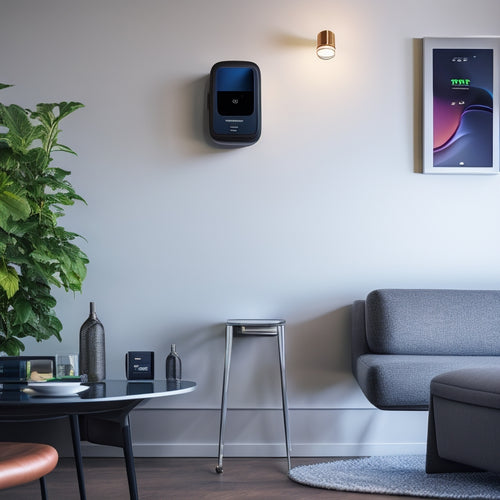
Automakers Revise Electric Vehicle Strategies Amid Challenges
Share
Ford and General Motors, among other automakers, are revising their electric vehicle strategies in response to escalating labor costs, softened EV sales, and shifting market dynamics. Rising labor costs, driven by a 25% wage hike, are expected to increase costs per vehicle by $850 to $900. As a result, automakers are reevaluating their EV strategies to prioritize economic viability and environmental sustainability. Amidst these challenges, companies are adapting by streamlining operations, optimizing cost structures, and shifting focus towards hybrid vehicles, which remain resilient in the market. As the industry continues to evolve, further strategic adjustments are likely to emerge.
Key Takeaways
• Ford and General Motors reduce electric vehicle ambitions due to rising labor costs and decreasing EV sales.
• Automakers recalibrate EV strategies to adapt to changing market dynamics and consumer preferences.
• Hybrid vehicles remain a priority, serving as a bridge between traditional engines and EVs, prioritizing affordability and environmental sustainability.
• Companies optimize cost structures through restructuring operations to balance production costs and consumer demand.
• Efficient cost management is critical for automakers to maintain economic viability and environmental sustainability amidst challenges.
Scaling Back EV Ambitions
Ford and General Motors, two of the largest automakers in the industry, are substantially reducing their electric vehicle ambitions, citing increased labor costs and decreased EV sales as primary factors contributing to this strategic shift.
The labor cost per vehicle is expected to increase by $850 to $900 due to the new labor deal with the United Auto Workers, which includes a 25% wage hike. This increase in labor cost, coupled with decreased EV sales, has led to a reevaluation of their EV strategies.
The shift in market dynamics has prompted these automakers to reassess their production plans, taking into account the rising labor costs and changing consumer preferences.
Electric Vehicle Market Shift
Meanwhile, the hybrid vehicle market remains resilient amidst the scaling back of electric vehicle plans, as consumers increasingly opt for alternatives that offer a balance between environmental concerns and economic considerations. This shift in market trends is largely driven by consumer preferences, which prioritize affordability and practicality alongside environmental sustainability.
As a result, automakers are adapting their strategies to cater to these changing preferences, acknowledging that hybrid vehicles can serve as a viable bridge between traditional internal combustion engines and fully electric vehicles. By doing so, manufacturers can better navigate the complexities of the electric vehicle market, where market trends and consumer preferences continue to evolve in response to emerging challenges.
Adapting to New Realities
As automakers recalibrate their electric vehicle strategies in response to shifting market dynamics and evolving consumer preferences, they must adapt to new realities that prioritize economic viability alongside environmental sustainability.
To navigate these challenges, companies are undertaking restructuring operations to optimize their cost structures. Cost management has become a critical component of their revised strategies, as they aim to balance production costs with consumer demand.
By streamlining operations and implementing efficient cost management systems, automakers can secure the long-term viability of their electric vehicle offerings.
This adaptation to new realities is essential for the industry's shift to cleaner transportation, as it enables companies to maintain a focus on sustainability while remaining economically competitive.
Frequently Asked Questions
How Will Reduced EV Production Impact Environmental Sustainability Goals?
Reduced EV production will likely increase the automotive industry's carbon footprint, hindering green initiatives and undermining environmental sustainability goals, as a slower shift to cleaner transportation will exacerbate climate change and air pollution concerns.
Are Automakers Shifting Focus to Hybrid Vehicles Instead of Electric?
As the EV dream fades, automakers pivot to hybrids, driven by market trends and consumer preferences; with hybrid sales thriving, it's clear that consumers are opting for a gentler shift to eco-friendliness, rather than an all-electric revolution.
Will Decreased EV Sales Affect the Overall Automotive Industry's Growth?
Decreased EV sales may impact the overall automotive industry's growth, as shifting market trends and industry outlook suggest a potential slowdown in sales, influencing industry performance and future market projections.
How Do Labor Agreements Influence Electric Vehicle Production Costs?
Labor agreements, such as those involving union dues, greatly impact electric vehicle production costs by influencing workforce efficiency, leading to increased costs per vehicle, as seen in Ford's 25% wage hike, affecting the automotive industry's bottom line.
Can Government Incentives Revitalize the Struggling Electric Vehicle Market?
Ironically, as automakers scale back EV plans, government incentives could be the spark that reignites the struggling electric vehicle market, with targeted tax credits and public awareness campaigns potentially revitalizing demand and driving sustainable growth.
Related Posts
-

3 Sun-Powered Automated Shades for Energy-Savvy Homes
You're looking to change your home into an energy-savvy haven, and sun-powered automated shades are an essential step...
-

7 Best EV Battery Health Trackers for Homeowners
You can maximize your electric vehicle's performance and lifespan by leveraging advanced battery health trackers that...
-

What Roofing Materials Best Protect Our Planet?
As you consider the environmental impact of your building, you're likely to find that the roofing material you choose...


